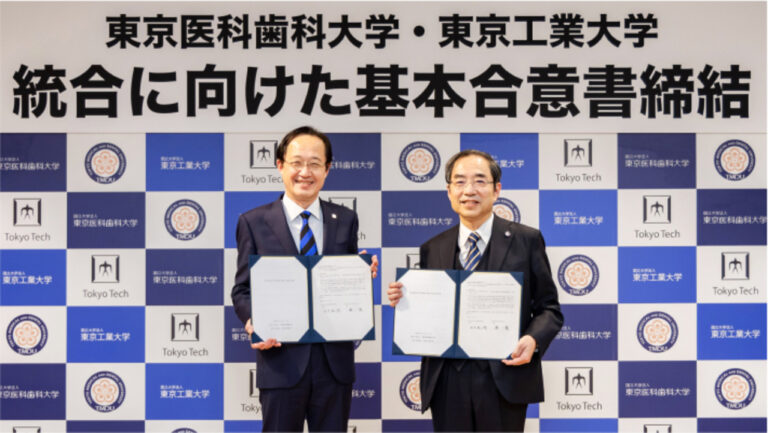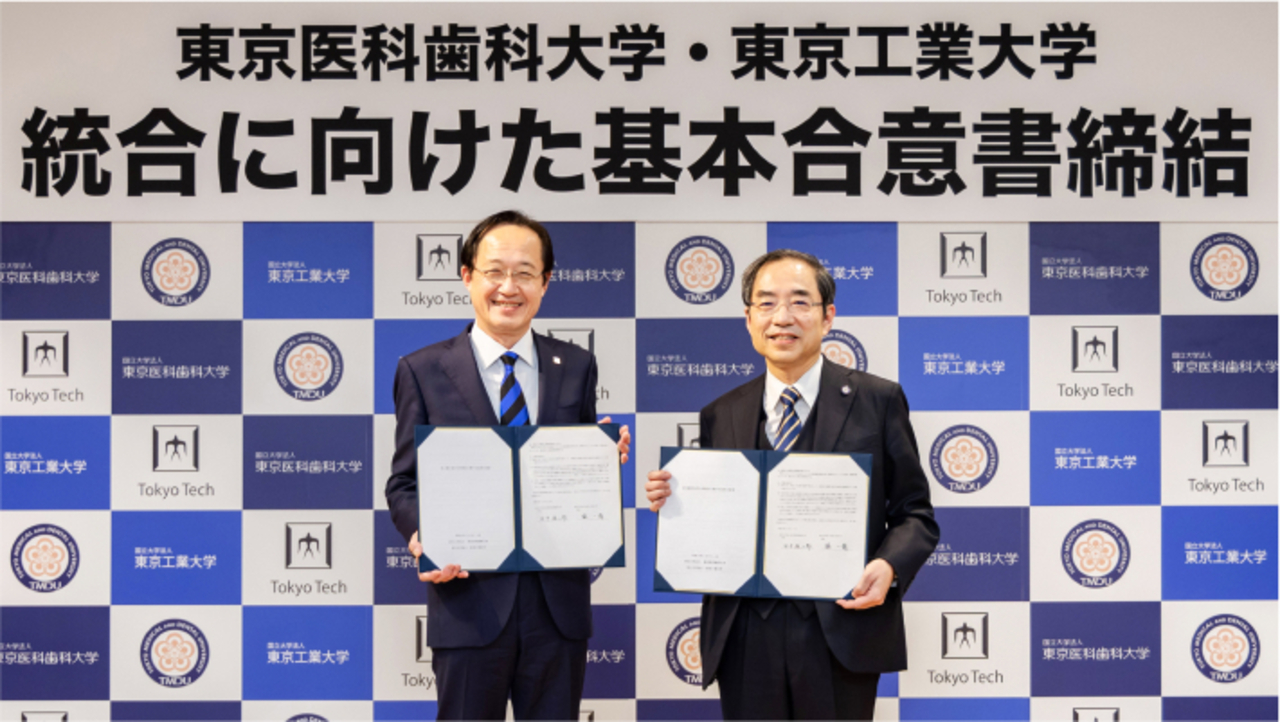

Tokyo Tech President Kazuya Masu (left) and TMDU President Yujiro Tanaka
National University Corporation Tokyo Medical and Dental University (TMDU) (President: Yujiro Tanaka) and National University Corporation Tokyo Institute of Technology (Tokyo Tech) (President: Kazuya Masu) have reached an agreement on the merger of the two national university corporations and their universities, Tokyo Medical and Dental University and Tokyo Institute of Technology, to form one national university corporation and one university. The two parties signed a basic agreement concerning the matter on October 14.
A formal decision on the integration will be made in accordance with the relevant laws and regulations. The merger is targeted for completion in fiscal year 2024, with the aim of achieving integration as soon as possible.
Both Tokyo Tech and TMDU are designated national university corporations as selected by the Minister of Education, Culture, Sports, Science and Technology. The unprecedented integration of the two designated national universities and the establishment of a new university will form a center of internationally outstanding education and research that will aim to forge a vibrant future together with society.
By combining the knowledge and numerous achievements related to science, engineering, medicine, and dentistry that they have accumulated to date, the two institutions can evolve into a new university that will help solve global issues such as environmental problems, emerging and re-emerging infectious diseases, and the declining birthrate and aging society.
The new university’s goals
1. Further promote cutting-edge research at both institutions
The new university will further strengthen the priority fields and strategic areas of both institutions by respecting research that answers fundamental questions and creating an open environment in which researchers are encouraged to conduct research rooted in their own interests.
2. Develop “convergence science” through cooperation and collaboration across departmental and other borders
In order to tackle various social issues, the new university will develop “convergence science”* based on comprehensive knowledge obtained through the convergence of science and engineering, medicine and dentistry, informatics, liberal arts, humanities, and social sciences.
- *
-
An approach in which multiple historically different disciplines converge, resulting not merely in addition (1+1=2), but rather the creation of new disciplines after convergence to discover unknown issues and solve social problems (1+1>2).
3. Produce highly specialized professionals who will pioneer the future based on comprehensive knowledge
By organically linking liberal arts education and specialized education, the new university will produce highly specialized professionals who will help identify and lead the way to solutions to various issues confronting modern society.
4. Nurture a culture of diversity, inclusion, and equity to foster innovation
The new university will achieve a high degree of diversity, inclusion, and equity for all constituents, building a place for the creation of knowledge and the development of talent that is open to the world.
The name and governance of the merged corporation and the new university will be decided by a joint preparatory committee of the two universities that will be co-chaired by the presidents of both universities.
About Tokyo Medical and Dental University
Tokyo Medical and Dental University was established as a national educational institution for dentistry on October 12, 1928, and is currently located in the Yushima/Shoheizaka area of Tokyo, which is considered sacred ground for scholarship and learning in Japan. As Japan’s only comprehensive medical university and graduate school, TMDU provides advanced medical treatment through a fusion of the medical and dental fields and works to cultivate “professionals with knowledge and humanity,” thereby contributing to human health and the well-being of society.
About Tokyo Institute of Technology
Tokyo Tech stands at the forefront of research and higher education as the leading university for science and technology in Japan. Tokyo Tech researchers excel in fields ranging from materials science to biology, computer science, and physics. Founded in 1881 as Tokyo Vocational School, Tokyo Tech hosts over 10,000 students at the undergraduate and graduate levels each year, many of whom develop into scientific leaders and the most sought-after engineers in industry. Embodying the Japanese philosophy of “monotsukuri,” meaning “technical ingenuity and innovation,” the Tokyo Tech community strives to contribute to society through high-impact research.